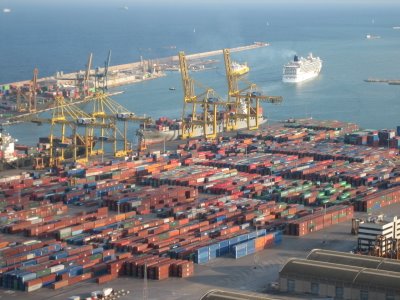Logistics: Information (Technology) matters every day more

This week-end I found some time to hang around the Barcelona Logistics Zone, hidden by the hill of Montjuic, at the Southern exit of the city.
I love watching the actual happening of international business. I believe the contemplation of merchandise trade flows helps understanding how the world goes round: a French container departs to Japan, a Chinese one arrives in Spain, etc. By the way, I suggest you combine harbor watch with reading a good Albert Londres novel for a unique, genuine, amazing brainstorming experience. It´s pretty much like making love whilst sipping a Chivas on the rocks.
Globalization has made the Information and Services Society hit the headlines, but though the feeling of distance might be abolished by IT, geography will never be annihilated. Moreover, we more and more tend to talk about what moves all around (capital, humans, goods, services, etc.) but tend to forget about what remains stable: distances. Distances matter more and more in a growing Consumers Society. We consume a hell lot of products, every day more products.
Products trade go through containers, a standardized metal "box" invented in the end of the 60s in Hong Kong. Containers fit the loading infrastructures of boats, airplanes, trains and trucks and are bound to at least use 2 of these transportation means during each trip, often more. Paradoxically enough, containers spend most of their time in storage areas like warehouses. Since containers are devised to make goods move from one place to another in a minimum period of time, one of the big challenges of supply chain management is to reduce storage periods.
This is where IT comes in: reducing storage time will lower working capital, and better the transaction economics. In this respect, IT can help.
78% of the logistics industry players make less than half a million dollars a year (source: International Data Corporation). Hence an overall limited of resources available for IT investments, which explains why, apart from MNCs who for a decade have been investing heavily to foster a competitive advantage. Trucking corporations have been particularly late in adopting Information Technology.
So far, it´s been proven (source: Ibid.) that the use of Internet & collaboration tools lowers transportation costs by 20% to 30%. Such achievements were reached thanks to:
- a better accountability of supply chain flows;
- inventory data sharing between manufacturers, transporters and retailers.
See for yourself, the best logistics companies are no more in the logistics business but in the information business. This is due to the very shift of the industry, enhanced by the generalization of EDI systems (Electronic Data Interchange) and soon-to-come (?) generalization of RFID.
I was always amazed by the FedEx tracking feature, allowing end-users to know exactly where a shipment is. I think information about one´s flows help accepting natural shipping delays due to geographical distances, never to be abolished. Let´s however make sure financial analysts don´t start analyzing logistics player stocks like media company ones...

1 Comments:
Thanks Emmanuel for this great article by the Wall Street Journal.
You´re right: globalization and trade expansion are constraining current infrastructures, resulting in higher investment needs to renew or upgrade it - which create jobs, and prepare for the future.
All in all, globalization & trade are part of a world economies virtuous circle.
By Jeremy Fain, at 8/10/2006 04:50:00 PM
Jeremy Fain, at 8/10/2006 04:50:00 PM
Post a Comment
<< Home